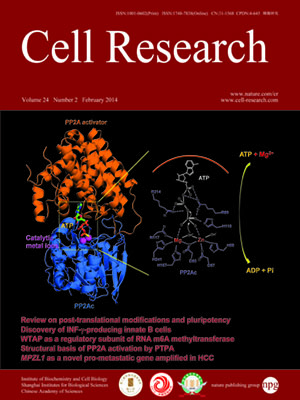
Volume 24, No 2, Feb 2014
ISSN: 1001-0602
EISSN: 1748-7838 2018
impact factor 17.848*
(Clarivate Analytics, 2019)
Volume 24 Issue 2, February 2014: 204-217
ORIGINAL ARTICLES
Amplification of MPZL1/PZR promotes tumor cell migration through Src-mediated phosphorylation of cortactin in hepatocellular carcinoma
Deshui Jia1,2, Ying Jing1,2, Zhenfeng Zhang1, Li Liu1, Jie Ding1, Fangyu Zhao1, Chao Ge1, Qifeng Wang3, Taoyang Chen4, Ming Yao1, Jinjun Li1, Jianren Gu1 and Xianghuo He1
1State Key Laboratory of Oncogenes and Related Genes, Shanghai Cancer Institute, Renji Hospital, Shanghai Jiao Tong University School of Medicine, Shanghai 200032, China
2Shanghai Medical College, Fudan University, Shanghai 200032, China
3Department of Pathology, Fudan University Shanghai Cancer Center, Shanghai Medical College, Fudan University, Shanghai 200032, China
4Qidong Liver Cancer Institute, Qidong, Jiangsu 226200, China
Correspondence: Xianghuo He, Tel/Fax: 86-21-64436539(xhhe@shsci.org)
We have previously identified 1 241 regions of somatic copy number alterations (CNAs) in hepatocellular carcinoma (HCC). In the present study, we found that a novel recurrent focal amplicon, 1q24.1-24.2, targets the MPZL1 gene in HCC. Notably, there is a positive correlation between the expression levels of MPZL1 and intrahepatic metastasis of the HCC specimens. MPZL1 can significantly enhance the migratory and metastatic potential of the HCC cells. Moreover, we found that one of the mechanisms by which MPZL1 promotes HCC cell migration is by inducing the phosphorylation and activation of the pro-metastatic protein, cortactin. Additionally, we found that Src kinase mediates the phosphorylation and activation of cortactin induced by MPZL1 overexpression. Taken together, these findings suggest that MPZL1 is a novel pro-metastatic gene targeted by a recurrent region of copy number amplification at 1q24.1-24.2 in HCC.
10.1038/cr.2013.158
FULL TEXT | PDF
Browse 2568


